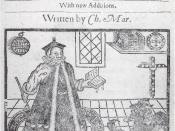Christopher Marlowe's famous play Doctor Faustus is, by Aristotle's definition, a tragedy. Along with the tragic main plot of the play there is a comic, less serious subplot as well. This essay will serve to show how the tragic main plot of Doctor Faustus interacts with the play's humorous subplot, the effect caused by this interaction, and how the presence of this subplot makes the play even more tragic. In the play, Doctor Faustus reaches his downfall because he attempts to reach beyond what he is capable of achieving. In the opening of the play, Faustus bids "physic farewell" (Faustus 258 / 25) for their is not enough success for him in the occupation of a physician. He forsakes law, for it is "too servile and illiberal" (Faustus 258 / 34) for him. He even decides that everyone "must die an everlasting death" (Faustus 258 / 42) and says "Divinity, adieu!" (Faustus 258 / 44).
In Faustus' mind, medicine, law and even divinity do not satisfy his vision of what he wants to become. Doctor Faustus decides that the "metaphysics of magicians and negromantic books are heavenly" (Faustus 258 / 45-46). He feels as though "a sound magician is a demi-god" (Faustus 258 / 56). He therefore decides to become a magician, and says "all things that move between the poles shall be at my command" (Faustus 258 / 52-53). This outstanding ambition is what leads him to his doom, for Faustus goes as far as selling his soul to the devil Lucifer to obtain magical abilities. The deal he strikes with Lucifer, is that he will have complete control over a lesser, but still very powerful devil Mephostophilis for the rest of his life. At the end his life, however, Faustus' soul will belong entirely to Lucifer. Hence, Faustus...


